
Pioneer African-American playwright Alice Childress takes a surefire theatrical genre (the backstage comedy à la Moss Hart’s Light Up The Sky or Ken Ludwig’s Moon Over Buffalo) and transforms it into an examination of mid-20th-century race relations in Trouble In Mind, every bit as relevant at Theatricum Botanicum in 2017 as it was in its 1955 off-Broadway debut … and every bit as hilarious as it is thought-provoking.
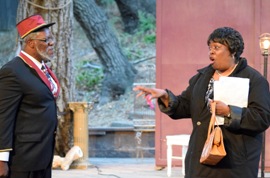 Wiletta Mayer (Earnestine Phillips) has been playing one gem of a maid after another (Crystal, Pearl, and Opal to name just three) for so many years now, it’s no wonder elderly doorman Henry (Rodrick Jean-Charles) recognizes Wiletta the moment she shows up at the Broadway theater where rehearsals are about to begin on Chaos In Belleville, a melodramatic Deep South potboiler if there ever was one.
Wiletta Mayer (Earnestine Phillips) has been playing one gem of a maid after another (Crystal, Pearl, and Opal to name just three) for so many years now, it’s no wonder elderly doorman Henry (Rodrick Jean-Charles) recognizes Wiletta the moment she shows up at the Broadway theater where rehearsals are about to begin on Chaos In Belleville, a melodramatic Deep South potboiler if there ever was one.
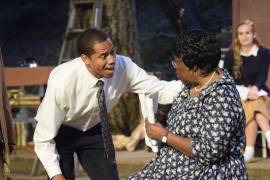 No wonder either that Wiletta has wisdom to impart to recent college grad John Nevins (Max Lawrence), cast as her character Ruby’s bound-to-be-lynched son. (“Tell ‘em you was in the last revival of Porgy And Bess,” she informs the eager young thesp, adding that whatever he does, he’d better keep his mouth shut about what he learned at school.)
No wonder either that Wiletta has wisdom to impart to recent college grad John Nevins (Max Lawrence), cast as her character Ruby’s bound-to-be-lynched son. (“Tell ‘em you was in the last revival of Porgy And Bess,” she informs the eager young thesp, adding that whatever he does, he’d better keep his mouth shut about what he learned at school.)
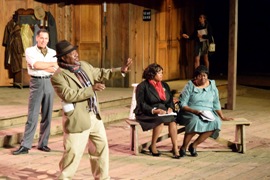 The only school elderly stage vet Sheldon Forrester (Gerald C. Rivers) ever attended was Hard Knocks, and like glamorous mink coat-clad Millie Davis (Constance Jewell Lopez), who specializes in garden-variety maids (Magnolia, Chrysanthemum, and Chaos In Belleville’s Petunia), he knows the best way to stay on good terms with a white director like Al Manners (Mark Lewis) is to flatter, nod in agreement, and laugh on cue, not that Al’s cowed young assistant Eddie (Frank Weidner) is any likelier to make waves, no matter how lily-white his skin.
The only school elderly stage vet Sheldon Forrester (Gerald C. Rivers) ever attended was Hard Knocks, and like glamorous mink coat-clad Millie Davis (Constance Jewell Lopez), who specializes in garden-variety maids (Magnolia, Chrysanthemum, and Chaos In Belleville’s Petunia), he knows the best way to stay on good terms with a white director like Al Manners (Mark Lewis) is to flatter, nod in agreement, and laugh on cue, not that Al’s cowed young assistant Eddie (Frank Weidner) is any likelier to make waves, no matter how lily-white his skin.
 Completing the cast of characters in both play and play-within-play are character actor Bill O’Wray (Christopher W. Jones) in the role of small-town big-shot politico Renard and fresh-out-of-Yale Judy Sears (Judy Durkin) as his pampered daughter Carrie, who sets Belleville chaos in motion when she asks Daddy to throw birthday gal Petunia and her fellow servants a barn dance, hardly the smartest move with local elections just around the corner.
Completing the cast of characters in both play and play-within-play are character actor Bill O’Wray (Christopher W. Jones) in the role of small-town big-shot politico Renard and fresh-out-of-Yale Judy Sears (Judy Durkin) as his pampered daughter Carrie, who sets Belleville chaos in motion when she asks Daddy to throw birthday gal Petunia and her fellow servants a barn dance, hardly the smartest move with local elections just around the corner.
Debuting the same year Rosa Parks took a historic stand by not giving up her seat, Trouble In Mind has lost hardly an iota of its relevance in the sixty-two years since it scored its writer the first-ever Obie awarded to a female playwright of color.
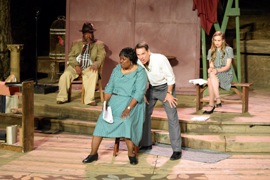 Childress’s characters may be archetypes, but each is a shades-of-gray human being with his or her own foibles, chief among them the redoubtable Wiletta, whose journey towards self-awareness, self-assertiveness, and self-respect gives Trouble In Mind a depth and resonance its lighthearted early scenes scarcely begin to suggest.
Childress’s characters may be archetypes, but each is a shades-of-gray human being with his or her own foibles, chief among them the redoubtable Wiletta, whose journey towards self-awareness, self-assertiveness, and self-respect gives Trouble In Mind a depth and resonance its lighthearted early scenes scarcely begin to suggest.
It helps enormously that director Ellen Geer (just entering her teens at the time Childress’s play is set) brings to the table wisdom gained from a life spent in and out of the theater, and the performances she has elicited from her crème-de-la-crème cast could not be more delightful, beginning with an absolutely stunning Phillips, not merely bringing Wiletta to vibrant life but inhabiting her body and soul.
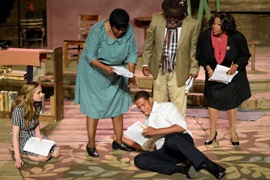 Lopez gives Millie a deliciously sassy sophistication, Rivers’s Sheldon masks oceans of pain under a jaunty exterior, and Lawrence shines bright in a role that must have been downright revolutionary in 1955, an articulate college-educated African-American at a time when Amos And Andy were still the norm.
Lopez gives Millie a deliciously sassy sophistication, Rivers’s Sheldon masks oceans of pain under a jaunty exterior, and Lawrence shines bright in a role that must have been downright revolutionary in 1955, an articulate college-educated African-American at a time when Amos And Andy were still the norm.
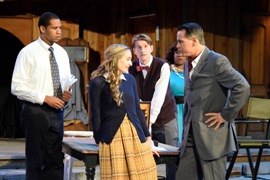 Lewis’s imperious, sexist, but nonetheless layered Manners, Durkin’s heartfelt, heart-in-the-right-place Judy, and Jones’s well-meaning if unconsciously racist Bill are all three absolutely terrific as are Jean-Charles’s still-feisty-at-78 Henry and Weidner’s ever dutiful Eddie.
Lewis’s imperious, sexist, but nonetheless layered Manners, Durkin’s heartfelt, heart-in-the-right-place Judy, and Jones’s well-meaning if unconsciously racist Bill are all three absolutely terrific as are Jean-Charles’s still-feisty-at-78 Henry and Weidner’s ever dutiful Eddie.
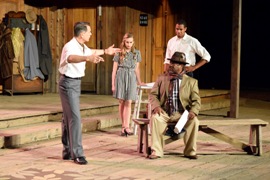 Zachary Moore lights Theatricum Botanicum’s permanent outdoor set (niftily adapted to suit Trouble In Mind’s backstage milieu) and Robert Merkel’s period costumes and Sydney Russell’s equally nostalgic properties quite expertly indeed, with sound designer Marshall McDaniel inserting some amusing effects along the way.
Zachary Moore lights Theatricum Botanicum’s permanent outdoor set (niftily adapted to suit Trouble In Mind’s backstage milieu) and Robert Merkel’s period costumes and Sydney Russell’s equally nostalgic properties quite expertly indeed, with sound designer Marshall McDaniel inserting some amusing effects along the way.
Jean-Charles, Clarence Powell, and Jacquelin Schofield are understudies. Kim Cameron is stage manager and Daisy Navarro is assistant stage manager. Beth Glasner is wardrobe supervisor. Skylar Johnson is lighting associate.
Described as “the only African-American woman to have written, produced, and published plays for four decades,” Alice Childress still has much to say a dozen years after her death. Theatricum Botanicum’s fabulous Trouble In Mind revival will remain in your mind long after its final, deliberately ambiguous fade to black.
The Will Geer Theatricum Botanicum, 1419 N. Topanga Canyon Blvd., Topanga.
www.theatricum.com
–Steven Stanley
August 27, 2017
Photos: Ian Flanders
Tags: Alice Childress, Los Angeles Theater Review, Theatricum Botanicum



 Since 2007, Steven Stanley's StageSceneLA.com has spotlighted the best in Southern California theater via reviews, interviews, and its annual StageSceneLA Scenies.
Since 2007, Steven Stanley's StageSceneLA.com has spotlighted the best in Southern California theater via reviews, interviews, and its annual StageSceneLA Scenies.







 COPYRIGHT 2025 STEVEN STANLEY :: DESIGN BY
COPYRIGHT 2025 STEVEN STANLEY :: DESIGN BY